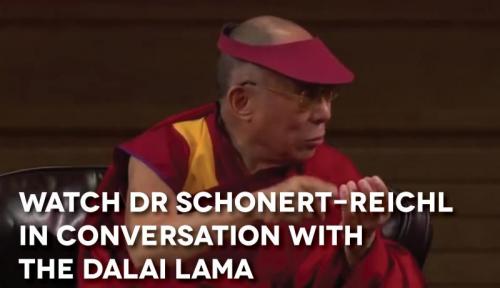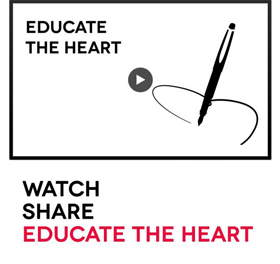An Interview with Dr. Kimberly Schonert-Reichl

Dr. Kim Schonert-Reichl is a UBC-based researcher, psychologist and educator. A long-time partner with the Dalai Lama Center, Dr. Schonert-Reichl will be appearing in Vancouver this week as part of the Center’s Educating the Heart series. I got a chance to sit down with Dr. Schonert-Reichl a few days before her talk to offer some insight into the role the DLC plays in the teaching of mindfulness. You can get more information about Dr. Schonert-Reichl’s talk here.
Dalai Lama Center. When did you first become involved with the Dalai Lama Center?
Kim Schonert-Reichl. I’ve been involved with the DLC since 2003. When the Dalai Lama visited Vancouver in 2004, Victor Chan (founding director of the DLC) contacted me. I had organized a conference on moral education and he wanted my involvement on a dialogue between the Dalai Lama, Desmond Tutu, Shirin Ebadi and others. My role was to organize and help communicate essays from high school students about what we called ‘Stories of Compassion.’ In 2006, I was very involved in the organization of that year’s conference and again in 2009.
WATCH: Dr. Schonert-Reichl in conversation with the Dalai Lama
DLC. What do you see as the role and the potential of the DLC?
KSR. The reason I have hung in for so long is because I see (The DLC) as playing such a critical role in heart-mind education. I have spent my whole career trying to figure out the way to educate the hearts of children and youth, and to promote what the Dalai Lama terms Positive Human Qualities: How to help, Empathy, Altruism, Optimism, Happiness, Caring, and Compassion. Most of my work has been to find out how we can do that in schools, in families and in communities. To have such a far reach of people from many different areas to come together to learn about the latest science and research on how to do this.
DLC. What are your expectations from this upcoming speaking engagement?
KSR. I’m a bit nervous (laughs). I spent the first part of my career going around speaking wherever I could about the importance of this education. But to tell you the truth, not too many people listened. At least that’s how it felt. I remember doing a talk over in Victoria in 1991 about vandalism at a junior secondary school. The majority of the people sat with their arms folded on their chest. It felt like there was a lot of eye rolling going on. But what has happened over past few years, along with a growing interest about the increased stress kids are under, you’ve got the school shootings, and suicides, all those kinds of things that get more attention, (combined with) an increased interest in (finding a way to) bring out the good in kids and people in general. Also, the neuroscience, which shows how mindfulness changes the brain, is very interesting. Put it this way: Ten years ago, if we were giving this talk, we’d be lucky to get 10 people. I think we’re on to something.
DLC. What do you attribute this increase awareness and interest in mind-heart education too?
KSR. There are a couple of things that have sparked this resurgence. One, Dan Goleman’s book from 1995, Emotional Intelligence, was a New York Times best seller. People had not really thought about this idea of how you manage your emotions, how you are able to understand other people’s point of view, and how this can help you to be successful in life. I think a lot of people are seeing that, yes, it makes sense to hire people who can get along with others. But I think the other factor is the number of problems that are emerging globally, through the Internet and TV. We’re confronted everyday with problems that children and youth face: Children who are abused, child soldiers, or suicides, all those things. People are now realizing how much we have to do something; people are realizing ‘this is our future world.’ We better help prepare them to take the lead.
The other thing is the science is coming out, the neuroscience, the science of SEL. We are now learning that if we focus on SEL at an earlier age, we can prevent many problems, we can prevent anxiety, we can prevent depression and aggression and that prevention would lead to fewer prisons, fewer medications. We can prevent these problems and create a better world for all.
DLC. Do you meet any resistance to mindfulness-based education? Is this something that some people have trouble understanding?
KSR. Although there has been a growing interest, (in mindfulness) it is still not well known. There is still resistance. (Critics say), “When I was a kid, you got punished and you learned from that.” There are still some obstacles in the sense of people really understanding what mindfulness entails. And also the notion of whose job it is. Teacher’s might say, ‘How can you give me more to do? I’m barely surviving as it is.’ Some people say ‘its just deadbeat parents not doing their job and now we have to pay for it.’ So, there are a lot of stereotypes about who should be teaching SEL still to overcome.
DLC. Is there anything you would like to add in conclusion?
KSR. One of the things that is so critical but is not yet happening is we need to have a clearinghouse for resources on how to do it, a place where teachers and parents can go and learn how to do this. Once you get people to realize why this is important, they’ll be hungry to know how. We can’t convince them its important and then say ‘now figure it out yourselves’. It is critical to note that the DLC is a process of developing these resources so parents, educators and communities know what to do.
Dr Schonert-Recichl will be speaking at the Goldcorp Centre for the Arts (SFU-Woodwards) on September 27th at 7:00 pm.
For more information about upcoming events, click here.
____________________________________________________________________________________
Jason Motz is a North Vancouver-based freelance writer and editor.








Comments
Post new comment